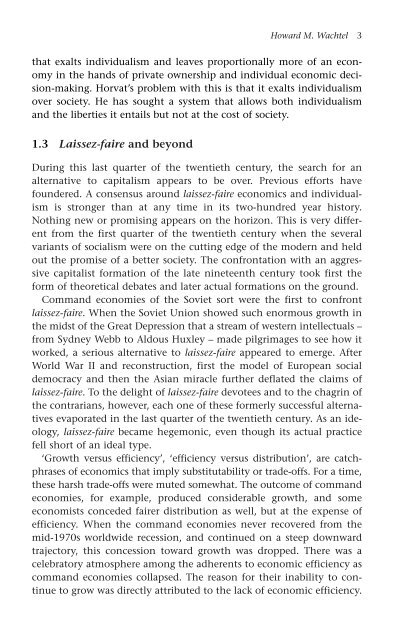Equality, Participation, Transition: Essays in Honour of Branko Horvat
Equality, Participation, Transition: Essays in Honour of Branko Horvat
Equality, Participation, Transition: Essays in Honour of Branko Horvat
You also want an ePaper? Increase the reach of your titles
YUMPU automatically turns print PDFs into web optimized ePapers that Google loves.
that exalts <strong>in</strong>dividualism and leaves proportionally more <strong>of</strong> an economy<br />
<strong>in</strong> the hands <strong>of</strong> private ownership and <strong>in</strong>dividual economic decision-mak<strong>in</strong>g.<br />
<strong>Horvat</strong>’s problem with this is that it exalts <strong>in</strong>dividualism<br />
over society. He has sought a system that allows both <strong>in</strong>dividualism<br />
and the liberties it entails but not at the cost <strong>of</strong> society.<br />
1.3 Laissez-faire and beyond<br />
Howard M. Wachtel 3<br />
Dur<strong>in</strong>g this last quarter <strong>of</strong> the twentieth century, the search for an<br />
alternative to capitalism appears to be over. Previous efforts have<br />
foundered. A consensus around laissez-faire economics and <strong>in</strong>dividualism<br />
is stronger than at any time <strong>in</strong> its two-hundred year history.<br />
Noth<strong>in</strong>g new or promis<strong>in</strong>g appears on the horizon. This is very different<br />
from the first quarter <strong>of</strong> the twentieth century when the several<br />
variants <strong>of</strong> socialism were on the cutt<strong>in</strong>g edge <strong>of</strong> the modern and held<br />
out the promise <strong>of</strong> a better society. The confrontation with an aggressive<br />
capitalist formation <strong>of</strong> the late n<strong>in</strong>eteenth century took first the<br />
form <strong>of</strong> theoretical debates and later actual formations on the ground.<br />
Command economies <strong>of</strong> the Soviet sort were the first to confront<br />
laissez-faire. When the Soviet Union showed such enormous growth <strong>in</strong><br />
the midst <strong>of</strong> the Great Depression that a stream <strong>of</strong> western <strong>in</strong>tellectuals –<br />
from Sydney Webb to Aldous Huxley – made pilgrimages to see how it<br />
worked, a serious alternative to laissez-faire appeared to emerge. After<br />
World War II and reconstruction, first the model <strong>of</strong> European social<br />
democracy and then the Asian miracle further deflated the claims <strong>of</strong><br />
laissez-faire. To the delight <strong>of</strong> laissez-faire devotees and to the chagr<strong>in</strong> <strong>of</strong><br />
the contrarians, however, each one <strong>of</strong> these formerly successful alternatives<br />
evaporated <strong>in</strong> the last quarter <strong>of</strong> the twentieth century. As an ideology,<br />
laissez-faire became hegemonic, even though its actual practice<br />
fell short <strong>of</strong> an ideal type.<br />
‘Growth versus efficiency’, ‘efficiency versus distribution’, are catchphrases<br />
<strong>of</strong> economics that imply substitutability or trade-<strong>of</strong>fs. For a time,<br />
these harsh trade-<strong>of</strong>fs were muted somewhat. The outcome <strong>of</strong> command<br />
economies, for example, produced considerable growth, and some<br />
economists conceded fairer distribution as well, but at the expense <strong>of</strong><br />
efficiency. When the command economies never recovered from the<br />
mid-1970s worldwide recession, and cont<strong>in</strong>ued on a steep downward<br />
trajectory, this concession toward growth was dropped. There was a<br />
celebratory atmosphere among the adherents to economic efficiency as<br />
command economies collapsed. The reason for their <strong>in</strong>ability to cont<strong>in</strong>ue<br />
to grow was directly attributed to the lack <strong>of</strong> economic efficiency.

















